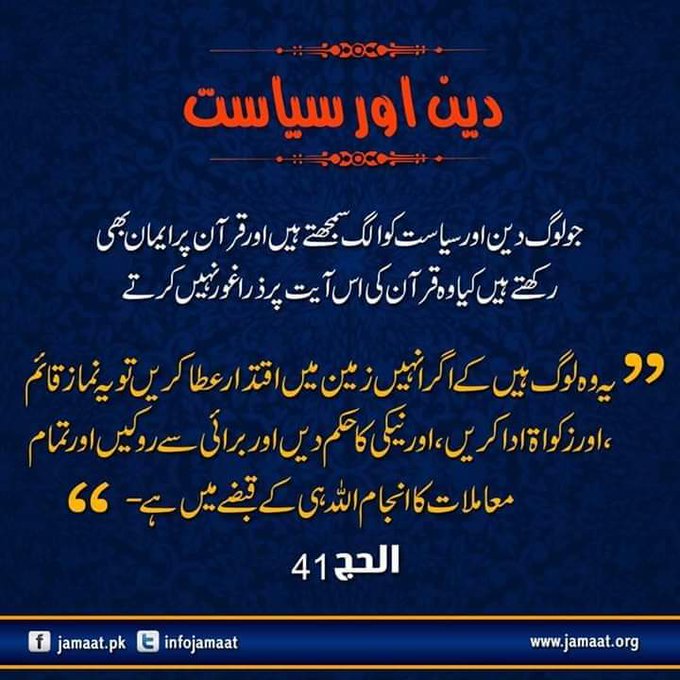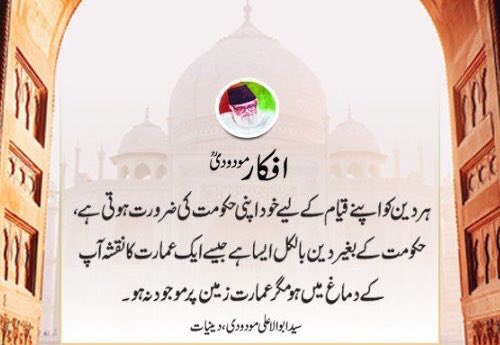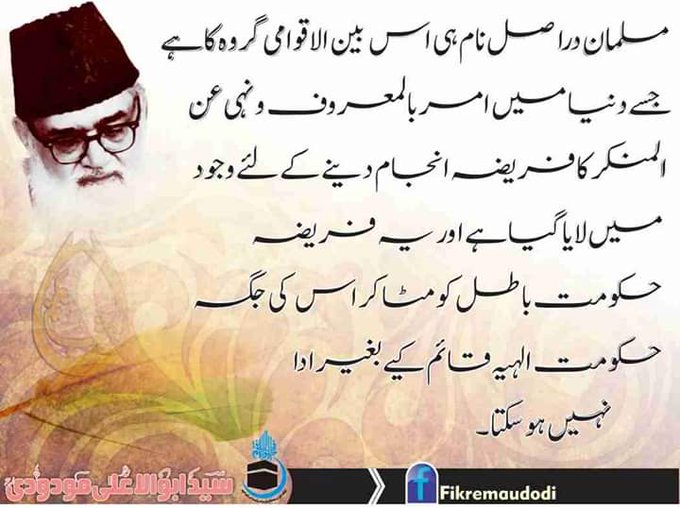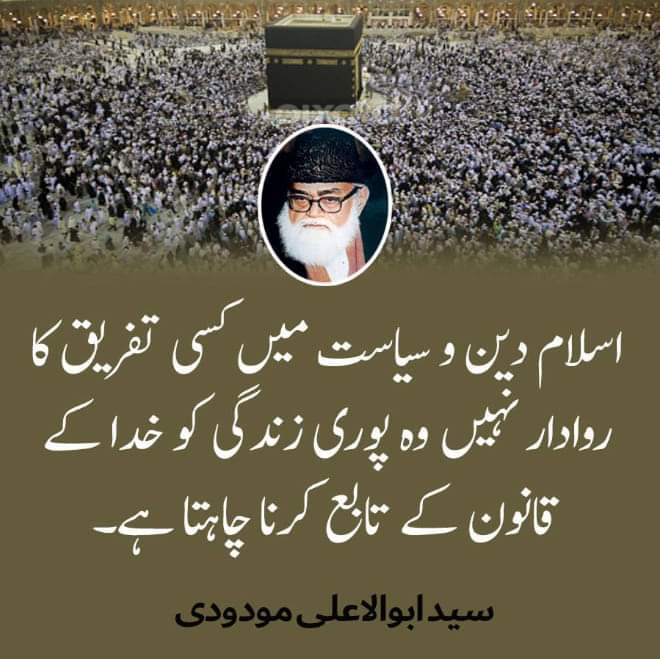Difference Between Religion & Deen & the Fault with Secularism
“This day I have perfected for you your DEEN and completed My favor upon you and have approved for you Islam as DEEN” (Holy Quran 5: 3)
Introduction
A colleague once asked me as to why I always bring Islam into everything. This is basically because Islam is not merely a religion. It is a complete way of life, or in other words it is a Deen. This will be explained here in this blog.
What is Islam?
Islam means submission to the Will of Allah. “This implies (i) Faith, (ii) doing right, being an example to others to do right, and having the power to see that the right prevails, (iii) eschewing wrong, being an example to others to eschew wrong, and having the power to see that wrong and injustices are defeated. Islam, therefore, lives, not for itself, but for mankind”.
Religion & Deen
Madhab, or religion, is a term used for a set of beliefs and rituals of worship. On the other hand, Deen refers to an entire way of life that pervades all aspects of life. In other words, as compared to religion, Deen is a far more comprehensive, all-encompassing reality.
Although in our part of the world we generally refer to Islam as Madhab (religion), yet what is interesting indeed is the fact that the word religion has never once been used in the entire treasury of the Quranic text and Ahadeeth literature! Instead, the word that has almost always been used for Islam in the original sources is Deen. The word DEEN has wrongly been translated as RELIGION in many translations of the Holy Quran.
The fundamental difference between the two terms must be understood. Madhab, or religion, is a term used for a set of beliefs and rituals of worship.
Religion is usually considered to be a set of beliefs and rituals performed to find favour with a believed deity. It is treated as a private aspect of life which should not have anything to do with the rest of life. It is considered to be an area where logic, reason or intellect do not have much of a role.
On the other hand, Deen refers to an entire way of life that pervades all aspects of life.
Deen is known as code of living in accordance with that of the Holy Prophet (PBUH) and striving to achieve the will of Allah. Religion deals with private affairs of life whereas Deen covers all aspects of life, individual as well as collective. From this perspective, every aspect of the life of a Muslim must be lived according to the Deen of Islam.
In other words, as compared to Madhab, Deen is a far more comprehensive, all-encompassing reality. With this backdrop, it will perhaps not be entirely correct to say that Islam is not a Madhab (religion), because all of the elements of a Madhab are certainly part and parcel of Islam – it includes the articles of belief, spirituality, and the etiquettes of worship (Salah, Saum, Zakah and Hajj).
Hence, it would be more accurate to say that Islam is not merely a Madhab/religion, but an entire code of life (Deen). It not only offers whatever constitutes religion, but is endowed with the elements of a complete way of life. Hence, Islam is, essentially, a Deen.
Every Second of our Lives maybe a Part of Deen
We should consider with intention that each and every moment of our lives is a part of Deen and as an Ibadah (worship) AS LONG AS IT IS NOT AGAINST THE TEACHINGS OF ISLAM. Not only prayers, Zakat, fasting, etc are acts of worship.
For example, driving to a teaching institution if done with the intention of:
Providing Halal for one’s family is Deen.
Imparting knowledge to students is Deen.
Studying, pursuing successful career for benefit of humanity, etc in case of students is also part of Deen and will be rewarded by Allah.
With such intentions, the drive to workplace and all the time spent at workplace will be considered as Ibadah (worship) and a part of Deen.
Even eating, drinking, sleeping, etc, each and every second of one’s life will be considered as Ibadah (worship) if they are done in accordance to the teachings of the Holy Quran & Sunnah (e.g. eating Halal food from Halal earnings, sleeping with intention of waking up in the morning for Fajr prayers) and better if prescribed prayers are made (e.g. prayers before and after eating, sleeping, going to washroom etc).
A doctor treating patients at a hospital, a policeman doing his duty honestly, a soldier learning the skills of battle with intention of safeguarding his country and thus Islam from enemies, a politician striving from heart and with honesty (no corruption) to implement Islamic system and values of justice, equality for all etc, all of these are acts of worship.
Hence a student studying all night for exams on the last 10 nights of Ramadhan will surely have attained Laila-tul-Qadr (night that is better than 1000 months) as reward.
This is because his/her intention is to:
- Acquire useful/valuable knowledge
- Become a doctor/engineer etc and earn Halal earning for the family
- Provide service to humanity by becoming a doctor etc
Similarly a doctor or any other person on duty in these blessed nights will also get the reward in sha Allah.
Even a trip to the shopping mall with intention of buying necessities of life is an act of worship (without committing Israaf-buying unnecessarily expensive items or over shopping).
My respected honorable Professor Dr. Hidayat once advised me “Teach Pharmacology as you are doing Ibadah and strive in this worship so much so that each and everyone of your students gets a good hold of the subject”
Deen for Whole Humanity
“Deen” has set of guide lines and laws based on which it evolves with time.
These guidelines are well defined and must cater for the whole universe for all times. These guidelines are not for a specific society or a group, they are for the whole humanity. Islam is the only religion which fits perfectly and truly on this definition where Quran defines all the laws of humanity and is a guidance for the mankind, Islam is a social system and it clearly yet precisely teaches every human being on how this God-gifted life should be led.
One Should Seek What Deen Guides Us in Every Walk of Life
Thus for every step we take in our lives, we should see what our Deen guides us. Our Deen guides regarding political issues, economic issues, social issues etc, meaning it guides us through all walks of life.
Religion & Politics
If man’s duty was only to worship Allah in a secular manner e.g. pray fives a day, fast, perform Hajj, then Angels could have done better. But Allah specifically states man has a special purpose in this life:
“I have Behold, thy Lord said to the angels: “I will create a vicegerent on earth. They said: “Wilt Thou place therein one who will make mischief therein and shed blood? Whilst we do celebrate Thy praise and glorify Thy holy (name)?” He said, “I know what ye know not”
(Holy Quran 2:30).
Man has been created as a Vicegerent/Viceroy on Earth. His job is to establish PEACE and JUSTICE on the land (thus establishing Khilafah).
This also answers the question some people ask as to what religion has to do with politics. Religion may not have anything to do with politics, but Deen has a lot to say about politics: how it should be run according to teachings of Islam.
With this way of thinking, a good Muslim observes major World and national events & assesses, analyzes their affects on the Muslim Ummah.
Pictorial Description of Religion:
Pictorial Description of Deen:
Total implementation of Islam:
The essence of true and authentic Islamic thought consists of the idea that it is not enough to practice Islam in the personal life only, but that the teachings of the Quran and those of the Sunnah need also be implemented in their totality in the social, economic, and political fields. In other words, it implies the establishment of the sovereignty of Almighty Allah (SWT) in the “religious” as well as the “secular” domains, or the removal of the dichotomy between collective life and state authority on the one hand and Divine guidance on the other.
These linguistic meanings constitute the concept of the word deen in the Qur’an where it implies a comprehensive system of life that is composed of four parts:
- The rulership and the authority belong to Allah
- The obedience and submission to this rulership and authority by those who embraced this
- The comprehensive system (intellectual and practical) established by this authority (Allah).
- The reward given by this authority (Allah) to those that followed the system and submitted to it and the punishment inflicted upon those who rebel against it and disobey it.
- No legislation will be done repugnant to the Quran and the Sunnah.
- No authoritarianism, mutual consultation.
It’s not that Islam cannot survive or support itself without political authority, but, in fact, it is the political authority that grows more and more corrupt unless it is subordinated to the commands of the Holy Qur’an and the Sunnah of Prophet Muhammad (SAW).
Those who are secular i.e. believe that Islam and politics should be kept separate do not believe that Islam has the answers to all problems of humanity.
Examples of Importance of Political Islam
1. We know that Riba (interest) has far reaching consequences on the economy of a nation including the fact that the rich become more rich and the poor become more poor.
Without prohibiting Riba there will continue to be short term and long term deleterious effects on the economy as well as upon the society including poverty, inflation, increase in national debts etc etc
2. One more example is the implementation of the Hudood laws e.g. Qisas, Punishment for theft adultery, accusing innocent women etc.
Carrying out these laws, there would cause a dramatic decrease in crime rate in the society as can be seen to a large extent in Saudi Arabia, despite all its other flaws.
Deen Will Prevail
Allah says that Islam is the only true “Deen” (which sadly, practically is in its worst condition right now, but
In shah Allah His Deen will eventually prevail – but not magically or overnight, we’ll have to work hard to make it happen):
[48:28] He it is Who has sent His Messenger with the Enlightenment and the Deen of Truth that He may cause it to prevail over all other systems of life. And Allah is Sufficient as Witness (to this Pronouncement (9:31-33), (14:48), (18:48), (48:28), (61:9)).
Thus Mr. Hamza Ali Abbasi tried to raise & prove a wrong point recently that the Islamic Government has no right to declare Ahmadis non-muslim, this right is only with Ulema or Muslim scholars. He was trying to separate state from Deen which is wrong as mentioned above and further cleared below.
Prophet Muhammad (PBUH), the Perfect Example
He is an example for all of mankind. He led a complete way of life: Deen, even recognized by Non-Muslims:
“Philosopher, Orator, Apostle, Legislator, warrior, conqueror of ideas, Restorer of rational beliefs, of a cult without images, the founder of twenty terrestial empires and of one spiritual empire. As regards all standards by which human greatness maybe measured, we may well ask, ‘is there any man greater than he?!” (Lamartine)
‘The union of the theorist, organizer, and leader in one man is the rarest phenomenon on this Earth; therein consists greatness’ by saying himself:
‘In the person of the prophet of Islam, the world has seen this rarest phenomenon on Earth, walking in flesh and blood.’ (Prof KS Ramakrishna Rao)
Jewish US psychoanalyst Mr. Jules Masserman gives three criteria for greatness. ‘Leaders must fulfill three functions’
- The Leader must provide for the welfare of the lead
- The leader must provide a social organization in which people feel relatively secure
- This leader must provide his people with one set of beliefs’.
Finally he concludes, ‘Perhaps the greatest leader of all times was Muhammad (PBUH, SubhanAllah), who combined all three functions and to a lesser degree, Moses (PBUH), did the same.’ He put his own prophet Moses after Muhammad (PBUT).
Secularism vs. Islam
What is secularism? It is “the belief that the state, morals, education, etc., should be independent of religion.”Any number of religions can be accommodated under a secular system, provided no demand is made regarding the application of religious criteria in defining social, economic, and political policies.
The selection of goals and the utilization of means in all collective affairs must not be inspired by any form of religious teaching; rather, such policy decisions should be taken only on the basis of human pragmatic thought and majority opinion.
Religion under a secular system is demoted to a personal and private affair of the individual. Thus, everyone is totally free concerning his metaphysical beliefs, rituals for worship, and social customs; the state won’t interfere in any of these.
Reality is that politics without guidance from Deen is directionless and will ultimately fail miserably and run into a total disaster.
At the same time, religion must not intrude or intervene in the running of the state either. Such a concept is, of course, diametrically opposed to the basic teaching of Islam.
Secularists do not believe in the concept of Islamic Ummah; they even go on to say that why should we care of the plight of Muslims in Syria, Palestine, Iraq etc? What have they done for Pakistan? And many other questions like these. This is because they do not have the right concept of Deen. It is because of the disunity in the Muslim Ummah & inability to understand concept of Deen that we have reached this stage:
Conclusion
Hence, Deen is a system of life in which human beings consciously surrender themselves to the sovereignty of a higher authority, and live a life of total obedience under the system of that higher authority, in order to gain rewards from it and to save themselves from its punishment.
And this explains the basic difference between Deen and religion. Deen is a complete way of life. We should all live every second of our lives as if we are worshipping God Almighty. This will certainly bring Peace (Islam) to the world.
“Say: Verily, my prayers, my sacrifice, my life, and my death are for Allah, the Lord of All the Worlds.” (The Holy Quran: 6: 162)
We pray for unity and understanding of Deen. Ameen.
Wa ma alaina illal balagh ul mubeen.












i learn so much from this thanks….
Thanks Jazak Allah
Great writting.
Thanks. Jazak Allah Khair
This is perhaps the single distinguishing aspect of our faith (Deen – social change) from other Deens.
What a tragedy that our own scholars loudly speak against it reducing Islam to a personal matter/ religion